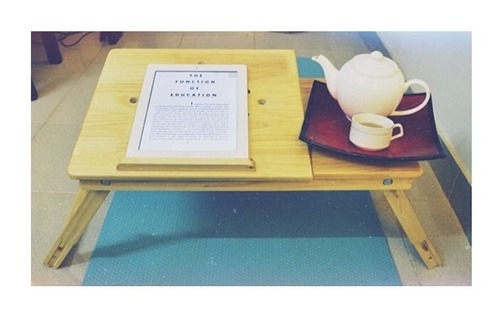Why We Fail our Reading Goals – Understanding Common Errors in Reading Practice
This is the 3rd week on Bookworm Wednesday. We talked about what makes a good reader and what makes a good read. We also discussed the importance of having the right intention for reading. Today let us examine why many can never seem to pick up and finish a book, regardless their conviction about the importance of reading.
I think there is a social consensus that reading is “good for you”. However this itself is inadequate for a person to form any regular practice. Take exercise, for instance. No matter how convinced our logical mind is about a theory, our own behaviors are largely governed by our subconscious mind. If we fail to understand them and befriend with our subconscious mind, we will face tremendous resistance in the process. Change will unnecessarily become an ordeal. And that’s precisely how most New Year Resolutions die by March. So now, let’s examine our own way of thinking:
 I’m too busy now. I can read next week.
I’m too busy now. I can read next week.
According to the Importance/Urgency grid – an incredible tool to personal mastery, created by Dr. Stephen Covey, – reading is a Quadrant II activity: high in importance but low in urgency. Renowned professor Randy Pausch, in his famous lecture, justly claimed the I/U grid to be Covey’s grandest legacy. Pausch was right.
Quadrant II activities – recreation, relationships building, personal development, reflection and so on – deserve our highest priority, time and attention. I guess we can all ambiguously agree with this theory. However, easier said than done. In the modern cult of speed and onslaught of distractions, most of us are so underwater with never-ending tasks and incessant noises that we hardly emerge to take a deep breath and see our situation with more sanity. However, do it we must.
Reading renews our mentality. It keeps our intelligence in good shape. The same task, the same situation, can be handled with more ease, accuracy and speed, by an adept mind. Besides, the potential to expand of human intelligence is limitless.
However if we don’t dare to jump off our hamster wheels, our intellectual capacity will never be enlarged enough for us to be free from our hamster wheels more often, and maybe, one day never have to frantically run on it again.
“I’m too busy now. I will read next week.” sounds reasonable. But of course, “next week” never comes because because we will also be busy next week. Why will we? Because we don’t care to invest in ourselves, now.
 I schedule reading time and take it as seriously as work. I read daily, and more in the weekend. Maybe that’s the first step for you to take too.
I schedule reading time and take it as seriously as work. I read daily, and more in the weekend. Maybe that’s the first step for you to take too.
 I’m not sure what to read about.
I’m not sure what to read about.
This equals to “I’m not really curious about anything in life”. And I think this is tragic. Eleanor Roosevelt once said "I think, at a child's birth, if a mother could ask a fairy godmother to endow it with the most useful gift, that gift should be curiosity."
How interested are you about life? Have you ever thought about the word life? About the vastness that it implies? Isn’t it interesting? Doesn’t it evoke your curiosity?
If a person no longer holds an endearing interest in life, I think he may as well be dead. The Walking Dead series have made such a hit – though I’m entirely not fond of it – but no need to buy DVD to see walking dead, just take a good look around.
Years ago, I was much more ignorant. My life was so tedious with nonsense classes, so distracted by noises and clutters, so suffered by the ripples of suffering in my parents and friends, so entertained by superficial entertainments, so wired & flattered by “urgent matters”. I thought I knew much.
‘The more you know, the more you know you don't know' – isn’t what Aristotle captured in this 11 words admirable?
 Find a moment when you can be alone, silent and uninterrupted. Ask yourself:
Find a moment when you can be alone, silent and uninterrupted. Ask yourself:
- What am I curious about?
- What bothers or confuses me?
- What do I want to understand more about?
- What is holding me back?
Answer them, they can be the title for your next book.
Yes, outwardly reading is quite different from clubbing. However inwardly the mental dynamic is far more superior. Those who fall asleep in the middle of a read don’t know how to read.
Reading, falsely believed to be an passive activity, is actually a very active one. Any good reader will say this. During a read, you form a partnership with the author. Your mentality should work on equal term with his. You want to understand, comprehend, connect, reflect, converse, imagine. You want to be confused, amazed, enlightened. You want to agree, or disagree. You want to do all the thing the author did when he wrote the line you are reading.
Before I start my reading session, I make a commitment to invest my brain power. I sit long with my back straight and relaxed. I hold a pen in my hand to underline words and scribble on the margin. Or highlight and doodle on a note when I read on my Ipad. I pause and re-read whenever I catch my mind wandering off from the silent conversation I’m having with the author. I pause to take a break when my concentration can no longer hold. I write review and summary after a read because expressing them in my own way helps me to solidify the new awareness – in fact, this very blog is a part of it.

Couple this read with other articles on BookWorm Wednesday
Come back next Wednesday for new wisdoms, advice on the art of reading, as well as my own book picks.






